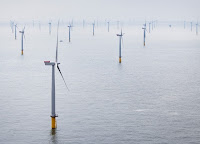Black or White? Why Germany's 'Energy Turnaround' needs Reconsideration
The cornerstones of Germany's energy turn-around can be admired in a hall in the northern port city of Bremerhaven. Standing on three rust-brown feet apiece, each of these immense, yellow-painted trunks weighs as much as 900 elephants. Soon, special ships will come and sink these steel monsters into the seabed, where they will support the wind turbines that are supposed to supply the country with green electricity.
Before they do, Environment Minister Peter Altmaier will go to Bremerhaven to inspect the work of Weser Wind and Areva Wind, the companies building them. Areva calls these wind-turbine supports "tripods." Peter Altmeier has a more poetic term, dubbing them "cathedrals to industrial culture."
This last week, there was a strict division of labor at several locations around the country. From Monday to Wednesday, the environment minister went on a whirlwind tour of Germany. Almost everywhere he went, workers wearing vests and helmets were welding, bolting, stacking and installing the building blocks of the country's energy revolution. Altmaier's job was to endow this work with symbolic significance, elevating as many of these welders as possible to the status of torch-bearers of the coming green republic.
The intended message is that Germany is moving away from nuclear power and embracing renewable energy sources. And, as the country's environment minister, Peter Altmaier is naturally the driving force behind the project.
The minister, who claims he will soon "have personally greeted almost every wind turbine and solar panel in Germany," has been in office for barely 100 days, yet he's already playing catch-up. According to current estimates of the date of the next general election, he may have as little as 15 months to make his mark on the mammoth undertaking that is Germany's energy about-face., which envisions making renewables account for 35 percent of the energy mix by 2020 and phasing out all of Germany's nuclear power plants by 2022. Read the full article, read more, and more, and more...


